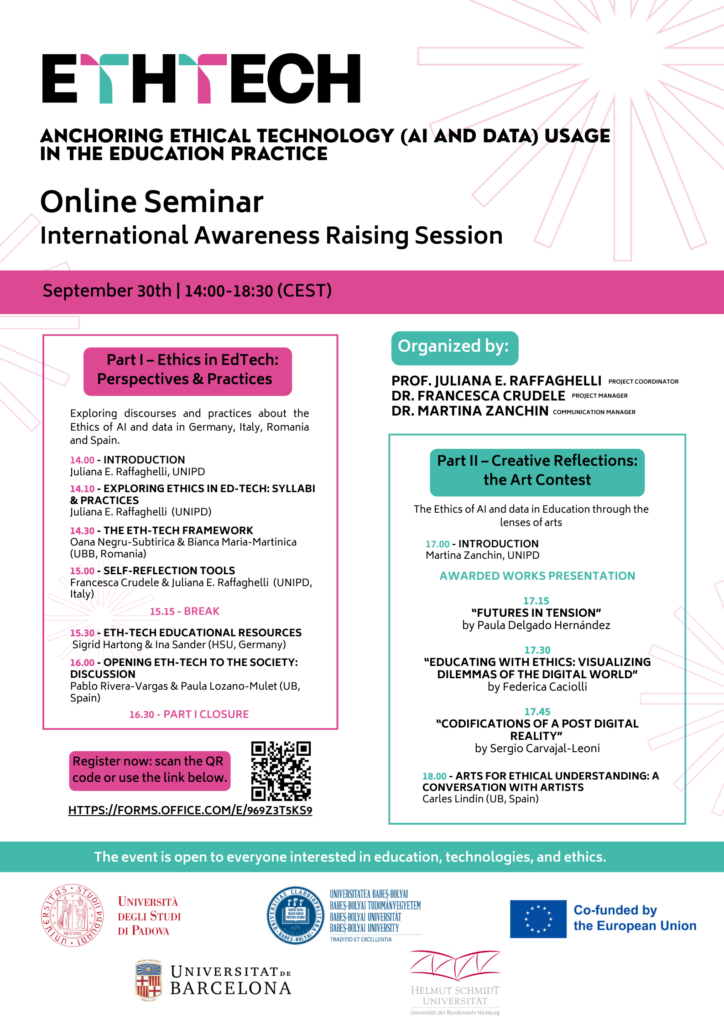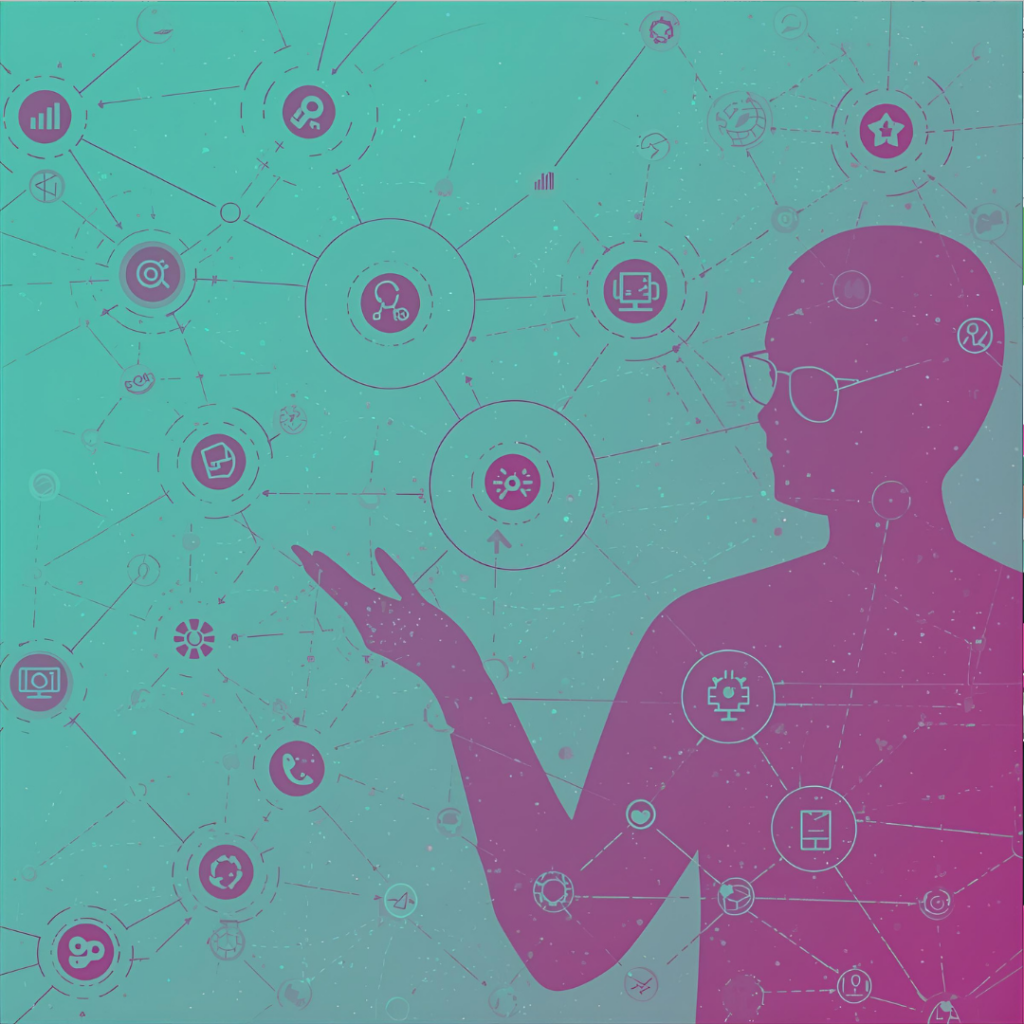
On 30 September 2025, the ETH-TECH project hosted its International Awareness Raising Session, an online seminar dedicated to exploring the ethical implications of artificial intelligence and data in education. The event brought together researchers, educators, doctoral students, practitioners, and artists from across Europe – and the World – creating a shared space for reflection on how emerging technologies are reshaping teaching, learning, and society.
The first part of the seminar offered a series of expert presentations introducing the project’s key research areas: ethical frameworks for EdTech, cross-country analyses, educational resources, and self-reflection tools designed to support critical engagement with AI. Each contribution provided valuable insights into how institutions and educators can navigate technological change with awareness and responsibility.
The second part shifted the focus toward creative inquiry, presenting the awarded works of the ETH-TECH Art Contest. Through visual storytelling, poetic or dystopic imagery, and experimental digital techniques, the three winning artists explored the tensions, dilemmas, and possibilities of our post-digital world. Their works opened an inspiring conversation on how art can deepen ethical understanding and stimulate new forms of critical dialogue in education.
This post offers an overview of the seminar, the themes discussed, and the creative reflections shared by the contest winners.
⭐ Part I – Ethics in EdTech: Perspectives & Practices
The first part of the seminar focused on presenting the core research areas and educational resources developed within the ETH-TECH project. Different from the ETH-TECH team introduced key components of the initiative, offering theoretical foundations, methodological perspectives, and practical tools to support educators, students, and institutions in navigating the ethical challenges posed by AI and data-driven technologies.
Their contributions highlighted the need for critical awareness, informed decision-making, and pedagogical strategies that place human values at the centre of technological innovation. Together, these presentations provided a comprehensive overview of the project’s objectives and the emerging insights from its ongoing research and development activities.
Below you can find the slides shared by the speakers during the seminar. Each presentation offers key points, methodologies, and visual summaries to support further reflection and classroom use.
Credits: Juliana E. Raffaghelli & Francesca Crudele (UNIPD, Italy), 2025.
Credits: Oana Negru-Subtirica & Bianca Maria-Martinica (UBB, Romania), 2025.
Credits: Juliana E. Raffaghelli & Francesca Crudele (UNIPD, Italy), 2025.
Credits: Sigrid Hartong, Ina Sander & Saskia Meinert (HSU, Germany), 2025.
Credits: Pablo Rivera-Vargas & Paula Lozano-Mulet (UB, Spain), 2025.
⭐ Part II – Creative Reflections from the ETH-TECH Art Contest
The second part of the seminar shifted from theoretical and methodological perspectives to creative exploration. We showcased the three winning contributions of the ETH-TECH Art Contest – selected from a Europe-wide call that invited participants to create visual cards inspired by the ten key concepts of the ETH-TECH Perspective Framework.
The contest encouraged a wide range of creative approaches: fully AI-generated imagery, hand-drawn or analogue techniques, and hybrid human–machine processes. Each submission included not only the final artwork but also a brief methodological note describing the creative choices, prompts used (when relevant), and the reasoning behind the visual interpretation.
The participants’ proposals were intended to transform ethical concepts – such as bias, planetary sustainability, politics, and identity – into visual metaphors that educators can use as powerful tools for dialogue. The cards are designed to spark discussion, invite multiple interpretations, and support activities such as brainstorming, scenario building, and critical reflection in the classroom.
By highlighting the role of imagery in ethical education, this session demonstrated how artistic practices can deepen understanding and open new pedagogical pathways for exploring the ethical dimensions of AI and digital technologies in a post-digital world.
In this regard, the three winners presented their contributions to the ETH-TECH Art Contest: Paula Delgado Hernández, Federica Caciolli, and Sergio Carvajal-Leoni each introduced their set of ten visual cards, explaining their experience, the inspiration behind their work, the creation process, and above all their perspective on the educational value of the cards they created.
Following their presentations, Dr. Carles Lindín, member of the ETH-TECH team, offered a thoughtful synthesis, connecting the artworks to broader ethical reflections, the project’s theoretical framework, and future opportunities for integrating creative materials into educational practice.

In conclusion…
The seminar proved to be a rich and stimulating space for reflecting on the role of artificial intelligence in both creative and educational processes. Questions, comments, and contributions from participants ignited a lively multidisciplinary dialogue, touching on themes such as data ethics, AI-assisted creativity, the value of handmade practices, and the pedagogical potential of visual imagery.
The diversity of perspectives – academic, artistic, and professional – highlighted how urgent it is to continue exploring the ways in which technology and humanity intersect within learning environments.
We warmly thank all participants and speakers for their valuable contributions and for making this moment of exchange possible. We hope the ideas shared during the session will inspire further discussions, educational practices, and future developments within the ETH-TECH project.
Explore the full range of ETH-TECH outputs – from research insights to creative resources and pedagogical tools. Each section offers materials designed to support educators, students, and researchers in navigating the ethical dimensions of today’s technologies.

🚩 Eth-Tech Framework – Discover the core ethical concepts guiding the project.
🖥️ Self-Reflection Tool – Reflect on your ethical stance toward technology.
📢 Contest Story – Follow the journey of the Art Contest from launch to deliberation and outcomes.
📚 Educational Materials – Explore images and resources for educators, with tips on how to use them in learning contexts.
✒️ Research Materials – Access research outputs developed through and in connection with the project.
Leave a Reply